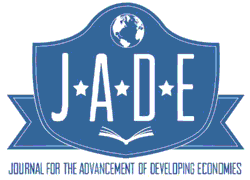Institute for the Advancement of Developing Economies

Journal for the Advancement of Developing Economies
Date of this Version
2017
Document Type
Article
Citation
Journal for the Advancement of Developing Economies 2017 Volume 6 Issue 1, pp 18-42
doi 10.32873/unl.dc.jade6.1.2
Abstract
This study focuses on evaluating the monetary, fiscal and external inflationary sources in Nigeria. The Auto-Regressive Distributive Lag estimation technique was adapted to capture these effects. Empirical findings of the study showed that overall, the main determining cause of inflation in both short run and long run periods in Nigeria, are more of monetary and external factors and less of fiscal sources. Specifically, the problem of inflation in Nigeria appears to be more of structural phenomenon than monetary in the short run. However, in the long run, combinations of monetary and external factors tend to be the major cause of inflation. The study also found the long run effect of lending rate on inflation to be indicative of the Neo-Fisherism effect.
Included in
Econometrics Commons, Growth and Development Commons, International Economics Commons, Political Economy Commons, Public Economics Commons, Regional Economics Commons


Comments
Copyright © 2017 JADE